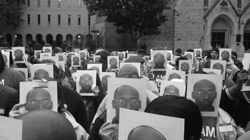There are two sides to every story. Two sides to everything someone could have seen. Two sides that determine what is true or false, who is innocent or guilty. Two sides to determine what is right and what is wrong.
Last Wednesday, September 21, Troy Anthony Davis, 42, was executed in the state of Georgia. He had been on death row for over two decades. His execution was sentenced four times before that, but on Wednesday, it was carried out.
Davis was convicted of murdering an off-duty police officer in 1989, according to amnestyUSA.org. The officer’s family waited for relief from the execution.
This seems like a natural course of events. A man killed another man, was found guilty of this crime, sentenced to life on death row, and was finally executed 20 years later. Justice has been served; life can carry on as if nothing ever happened in the first place.
But here’s the thing- Troy Davis, although convicted, had substantial evidence proving his innocence.
According to the Innocence Project, a non-profit organization that uses DNA to prove wrongfully convicted prisoners innocent, seven of nine key eyewitnesses recanted their testimonies in recent years. DNA evidence from the scene of the crime did not match Davis’. Another man, whose DNA actually does match the crime scene, confessed to killing the cop.
Because of all of these factors, the Supreme Court reviewed the case in a four hour postponement of the execution Wednesday night, according to ABC News. Still, Troy Davis lost his life by lethal injection at 11:08 pm that night. Why?
Why did a potentially innocent man have to lose his life in order for a family to get a sense of justice served? Why, despite serious evidence exonerating him, did the United States Supreme Court decide that Davis was still guilty? Why did legal matters not protect Troy Davis? Why did it take the possibility of a man losing his life to draw together our country, to call for a reform in the court system?
Before Elizabeth Webster, the publications manager for the Innocence Project, came to the University to speak about the organization two weeks ago, I had never heard of Troy Davis. I had never heard of the Innocence Project. I was unaware that there was any type of organization that looked at DNA to help exonerate potentially innocent individuals who had been convicted nonetheless.
I thought that because someone was convicted, they had to be guilty. I was thinking about reasonable doubt. Highly publicized cases told me all about reasonable doubt. Because of this, people like O.J. Simpson and Casey Anthony walked free. Surely, knowing this, all cases worked similarly. Right? Wrong.
Those highly publicized cases had phenomenal defense attorneys. Troy Davis had appeals, urged by powerful global officials and evidence. Despite support from the Pope, former President Jimmy Carter, and numerous human rights groups, the Supreme Court still decided against him in a five to four vote.
The Supreme Court did not give an explanation of its decision. For four hours, they deliberated. They gave Davis, his family, and thousands around the world hope that Davis would not be losing his life that night.
The Supreme Court not only took away our hope, but also our trust. How can we, as Americans, trust in a judicial system that cannot explain a decision like this, a decision where substantial evidence proves innocence? Was the evidence pointing against Davis not enough for reasonable doubt?
Davis had a plethora of public support. He was a trending topic on Twitter and had the backing of many politicians and celebrities. Protesters held a vigil for him; those who could stand together did, displaying messages like “Not in my name” and “I am Troy Davis.”
Reasonable doubt grouped these individuals together, and held them together to support Davis’ life. But reasonable doubt turned on everyone; it rejected them. Reasonable doubt became nonexistent.
Now is the time for us to act to change laws that do not make sense. Now is the time for us to reform the court systems to accept evidence like the kinds Davis had supporting him. If we do nothing, nothing changes.
After all, I am Troy Davis, and so are you.
PHOTO COURTESY of newsone.com

